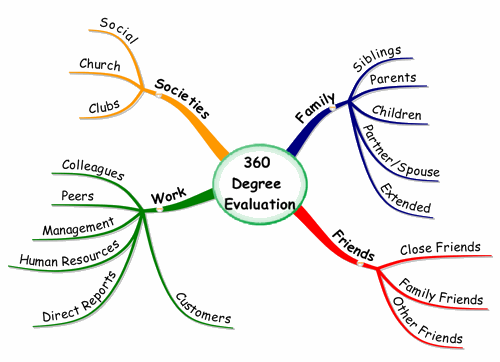Using Mind Maps for a 360 Degree evaluation of yourself...

Get Access to the Best Mind Mapping Tips, Tools, Techniques Resources and Opinions.Subscribe to Using Mind Maps
For those of you that don't know what a 360 degree evaluation is, it is an evaluation method whereby people of different roles in your life evaluate you. The last 360 degree evaluation I had was by my managers, my peers, my colleagues, my direct reports, human resources and my internal customers.
The term '360 degree' comes from the angles around a circle. They add up to 360 degrees. A 360 degree view of yourself is therefore a complete circle view, as it done by the people around you.
An exercise like this can be quite daunting, as it evaluates your interaction with those around you based on their opinion. We all build up ideas of how we are, but how does the rest of the world see us.
You cannot prepare for an evaluation like this. You cannot swot, you cannot cram and you definitely cannot cheat!
The opinions of some of the people evaluating me were based on more that a decade of knowledge.
I definitely learned a lot from the feedback, as some of the perceptions I had of myself were completely off the mark. I came out okay and I don't think I will be fired soon as a result of the outcomes of the evaluation (sigh of relief), but it does afford me the opportunity to work on the areas that need improvement.
Is it possible to do your own evaluation?
The formal 360 degree assessment that I did, was run by a company that has the specialist knowledge and tools to do the evaluation, so it will be difficult to 'do this at home'. But coming out of the evaluation, I asked myself, 'How can I use this information to benefit others, particularly my group of loyal readers!'
I then thought of something that Stephen R. Covey said in 'The Seven Habits of Highly Effective People'. He asked you to imagine going to a funeral. As you came closer, you realised that it is YOU lying there. People are milling around the casket, talking. And, guess what, a lot of the conversation is about you!
What do you think they are saying about you? Are you happy with what they are saying?
He then asks you to think of what you would like them to say. Does this tie up with what you think they are saying?
Using a Mind Map to build up your own 360 degree view
As I write about Mind Mapping and how it can help you in all walks of life, my mind immediately went to work on how to use a Mind Map to build a better 360 degree picture of yourself.
Think of all the important people in your life and categorise them. You could categorise them into family, work, friends, etc. You could also break this into sub categories, e.g. siblings, children, parents, management, peers, etc. Can you see the basis of a Mind Map forming? Don't worry, I will give you a Mind Map framework for this at the end of the article.
If you only want to build one for your professional life, that is also okay. You will then restrict the categories to some of those that I mentioned in the opening paragraph.
You don't have to list the names of the people on the Mind Map, you could simply list the categories if you want to.
Now think of what you would like them to think and feel about you. Don't leave out the emotions. How people 'feel' about you is as important as what they think about you.
Once that is complete, you can evaluate yourself against what you think they actually feel about you. If you are brave enough, you can even ask them!
Building a development plan for yourself
While this knowledge is very inciteful, it is of no use if you don't put some kind of action plan in place to improve yourself.
List the areas that you would like to improve and write down the steps that you are going to take to improve.
Do this exercise again in a year's time and see whether you have improved and whether you are moving forward, stagnating, or actually moving backwards!
I hope this short article will get you to think a bit about your life, where you want to go and what impact you want to play on those around you.
Return to Using Mind Maps Home Page



